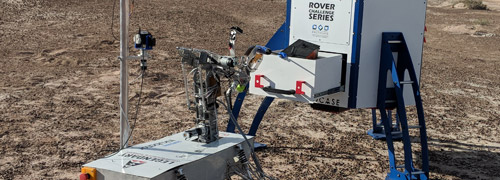Driving Innovation – Powering Change

Limited hydrogen infrastructure and production may have put the brakes on the widespread commercialization of fuel cell vehicles, but a southern California company continues to tout the technology as part of the transformation to a zero-carbon economy.
RockeTruck, Inc. was established in 2020 by a trio of veteran engineers interested in developing and manufacturing fuel cell trucks. In fact, the company name reflects its initial intent to make fuel cell or battery-powered large commercial vehicles that resembled a bullet train or rocket.
However, the company opted to pivot its focus after just a couple of years due to a lack of R&D funding, declining interest in the development of vehicles powered by hydrogen fuel cells and the abundance of other tech companies pursuing the same interests.
“It just didn't really come to pass with the trucks, but we did find some opportunities here in California in regards to stationary power generation, so we decided we needed to adapt and change our focus a bit,” says RockeTruck chief engineer Jurgen Schulte, who has been collaborating with fellow co-founders Mike Simon, (company president and CEO) and Dr. Paul Scott (chief scientist) for the past 30 years.
INDUSTRY VETERANS

Collectively, the three-man executive team has decades of experience in the development of advanced power generation systems and components through the use of climate-friendly technologies.
Prior to RockeTruck, Simon established two successful startups. He was joined by both Scott and Schulte at ISE Corporation, while he later co-founded Transportation Power (“TransPower”) with Scott. TransPower was acquired by axle-manufacturer Meritor, which in turn was acquired by Cummins in a multi-billion acquisition in 2022.
Over time, the three engineers have been heavily involved in both the EV and fuel cell sectors. Their work has included hybrid concept truck design, a fuel cell transit bus and an EV truck.
Following its establishment, RockeTruck raised seed capital from a group of private investors that included two of the company co-founders. They subsequently leveraged that investment through an injection of about $5 million in non-dilutive funding from a number of public sources, including California Energy Commission, U.S. Department of Energy and South Coast Air Quality Management District.
ROCKETRUCK PROJECTS

With a mission to develop power generation systems that utilize clean and sustainable fuels, RockeTruck integrates proven components into innovative power system architectures to accelerate near-term adoption, while working in parallel to develop new core technologies to enable long-term system improvements and cost reductions.
RockeTruck is presently manufacturing hydrogen fuel cell generators and components, lithium-ion batteries, integrated batter energy storage systems and advanced power conversion devices using wide bandgap semiconductors.
More specifically, the San Diego-area company has partnered with California State University, Los Angeles (Cal State LA) to develop a mobile fuel cell generator (MFCG) that can be easily transported to deliver clean electric power when traditional grid power is unavailable.
Phase 2 of the project aims to reduce the size and weight of the portable generator so it can fit in the bed of a pickup truck.
“We won’t be able to power a whole neighborhood for two days with this system, but we can power a construction site or a building for a day or so,” says Simon. “We think that’s more in line with what portable generators are generally used for and that’s why the MFCG Mini is designed to fit in the back of a heavy, super-duty pickup truck.”
The first prototype MFCG sits atop a customized 20-ft trailer. It carries a fuel cell rate at 80 kW, a large supply of hydrogen fuel, a small supplemental battery storage system, and power conversion and control electronics.
Future initiatives will build on that foundation through the manufacturing of heavy-duty trucks and buses that use zero-carbon propulsion systems. The company plans to equip its Escondido manufacturing facility with state-of-the-art renewable power generation and energy storage systems.
WORKING WITH PROTOCASE

According to Schulte, the aforementioned MFCG Mini was designed in a way that allows RockeTruck to outsource much of the manufacturing work such as panels and packaging.
Already familiar with Protocase from his time at SpaceX, Schulte once again turned to the trusted AS9100D-certified supplier.
“It was a long time ago, but I remember ordering a lot of cabinets from Protocase that were used in test set-ups at SpaceX, so that facilitated our current partnership for manufacturing fuel cell generator components,” he says.
Schulte says the RockeTruck’s collaboration with Protocase has increased his company’s operational efficiency by eliminating the need for overhead such as in-house welding and extensive construction drawings.
“It empowers a single-person engineering capability at RockeTruck, which has significantly reduced our overhead compared to using local manufacturers. In general, Protocase is very cost-competitive, even if the products are being shipped across the continent,” he says.
“And, the components they make for us are very good, from the right finish to the right tolerances – Protocase makes my life as an engineer easier.”
RockeTruck is in the midst of creating the “mini” version of its mobile fuel cell generator. Schulte initially used Protocase for test set-ups and smaller assemblies, but has since proposed that the supplier build the whole structure.
“Using Protocase gives us a certain freedom as it reduces our workload as long as we know where the limits are and what input is required.”

